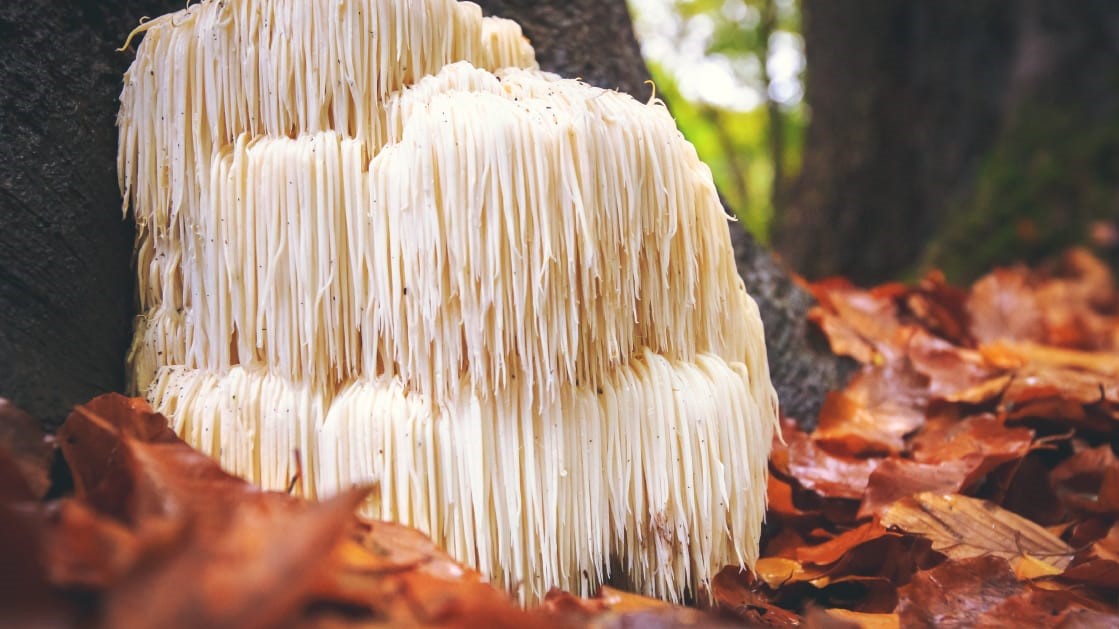Lion’s mane mushrooms are also known as hou tou gu or yamabushitake. These mushrooms are large, white, and fuzzy that look similar to a lion’s mane as they grow. Lion’s mane mushrooms are used medicinally and in cuisine in countries like India, China, Japan, and Korea.
You can consume lion’s mane mushrooms raw, cooked, dried, or even steeped in tea. Lion’s mane mushroom extract is often used in health supplements.
Lion’s mane mushrooms are packed with health benefits, including:
Protection against dementia
Studies have found that lion’s mane mushrooms have two compounds that can stimulate brain cell growth, leading to cognitive improvement: hericenones and erinacines.
Other studies show that lion’s mane mushrooms can help protect against Alzheimer’s disease.
A study done in older adults with mild cognitive impairment found that consuming three grams of lion’s mane mushroom in powder form every day for four months led to significant cognitive improvement. These benefits disappeared when the people stopped taking the supplements.
Helps fight depression and anxiety
Though there are many causes of anxiety and depression, researchers have found that chronic inflammation is likely a major contributing factor. Research has found that lion’s mane mushroom extract has anti-inflammatory effects that may reduce symptoms associated with anxiety and depression in mice.
May speed up recovery from nervous system injuries
The nervous system is made up of the brain, spinal cord, and other nerves that travel through the body. These parts work together, sending and transmitting signals to control nearly every function of the body.
Injuries to the brain or spinal cord are often devastating and can be life-altering as well. Brain and spinal cord injuries often lead to paralysis or loss of mental functions that can take a long time to heal.
Researchers have found that lion’s mane mushroom extract can help speed recovery from these kinds of injuries by stimulating nerve cells’ growth and repair. Lion’s mane mushroom extract has been shown to reduce recovery time by 23–41% when it was given to rats with nervous system injuries.
May reduce the risk of heart disease
Major contributing factors to heart disease include obesity, high triglycerides, large amounts of oxidized cholesterol, and an increased tendency to get blood clots.
Research has shown that lion’s mane mushroom extract may influence some of these factors and reduce heart disease risk.
Mice and rat studies have found that lion’s mane mushroom extract improves fat metabolism and lowers triglyceride levels. Since obesity and high triglycerides are both considered risk factors for heart disease, this is one way that lion’s mane mushrooms contribute to heart health.
Helps manage symptoms of diabetes
Diabetes happens when the body can no longer control blood sugar levels, and the levels become continuously elevated.
Chronically high blood sugar levels eventually lead to more serious complications like kidney disease, nerve damage in the hands and feet, and even vision loss.
Lion’s mane mushroom may help manage diabetes by improving blood sugar control.
Lion’s mane extract may also reduce diabetic nerve pain in the feet and hands.
Reduces Inflammation and Oxidative Stress
Researchers believe that chronic inflammation and oxidative stress may be the root of many modern illnesses, like heart disease, cancer, and autoimmune disorders. Research has shown that lion’s mane mushrooms contain potent anti-inflammatory and antioxidant compounds that can help reduce these illnesses and their side effects.
One study examined the antioxidant abilities of 14 different mushroom species and found that lion’s mane had the fourth-highest antioxidant activity and recommended it be considered an excellent dietary source of antioxidants.
Immunity booster
A robust immune system is key to protecting the body from bacteria, viruses, and other pathogens that can cause disease. A week immune system puts the body at a higher risk of developing infectious diseases.
Research done on animals has shown that lion’s mane mushroom can improve the immune system by increasing the intestinal immune system’s activity– this protects the body from pathogens that enter the gut via the nose or mouth.
Beneficial changes in the gut bacteria that stimulate the immune system after consuming lion’s mane mushrooms are likely the cause of these effects.
As we outlined, lion’s mane mushroom and the extract are shown to have several health benefits, including protecting against dementia, reducing anxiety and depression symptoms, and boosting immunity.
⚠️ The statements in this article have not been evaluated by Health Canada. Use of mushrooms or any supplements should always be discussed with a healthcare professional.

